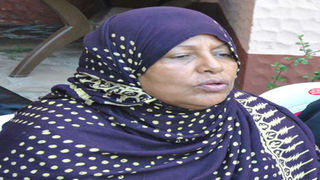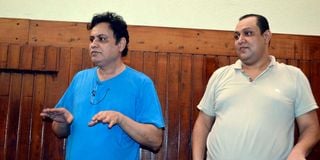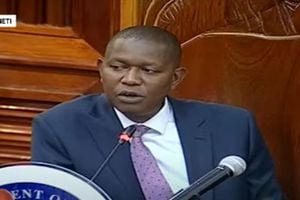
Fatma Baktash Akasha, mother of Ibrahim and Baktash Akasha, in a past photo.
| FileMombasa
Premium
Family of convicted drug baron Baktash Akasha hit by High Court ruling
The High Court has ruled that the wife and mother of convicted drug baron Baktash Akasha have failed to prove that they are the sole owners of some items seized in a raid, which they are seeking to have returned to them.
Justice Eric Ogola said if Baktash and his brother Ibrahim Akasha were convicted of drug-related offences, it meant that most of their properties and items were acquired through the proceeds of drug sales and such property was liable to forfeiture to the government.
Ms Najma Juma and her mother-in-law, Ms Fatma Akasha, had sought to have some properties seized by police during a raid on their upmarket Nyali home in November 2014 returned to them.
The petitioners sought a declaration that the continued detention of their properties was unlawful and in violation of their constitutional rights.
“The petitioners should prove their source of income and prove that the properties were not acquired through criminal proceeds so as to claim ownership of the items and properties as sought,” ruled Justice Ogola.
The judge ruled that the properties and items sought by the petitioners could not be returned at this stage because they are part of an investigation.
The petitioners had sued the Director of Public Prosecutions, the Inspector General of Police, the Director of Criminal Investigations, the heads of the anti-narcotics units, the Coastal Region Police Commander and the Coastal Region Criminal Investigation Officer.
Hand chain with coins
The items they wanted returned are two vehicles, a mobile phone, a pistol, a vehicle log book, seven gold chains, seven gold earrings and a hand chain with coins.
Justice Ogola ruled that the court was satisfied that the respondents, in seizing the items and properties from Baktash's house, were exercising powers conferred on them by the constitution and statutes in the enforcement of the law.
“I therefore fail to find that this process infringes on the petitioners’ right either to property or to privacy,” said Justice Ogola.
However, the judge noted that it was evident that the respondents had waited a very long time before instituting forfeiture proceedings.
“Nevertheless, items and properties that are suspected to be proceeds of crime cannot be returned without proper investigation into the circumstances under which they were acquired,” said Justice Ogola.
Justice Ogola, however, ordered that all the seized birth certificates be returned to the petitioners as the respondents had not explained why they were not returned to them.
The court also ordered that forfeiture proceedings be commenced within 60 days, failing which the petitioners may file an application for the release of all seized items and properties that are not subject to any legal process.
The petitioners also sought a declaration that the properties were not part of the extradition proceedings in terms of the applications and submissions made and were therefore not subject to forfeiture.
The extradition proceedings were instituted by the DPP against Baktash, Ibrahim, Gulam Hussein and Vijaygiri Goswami.

Drugs suspect Vijayghiri Goswami (left) and his co-accused Baktash Akasha Abdalla during a bail hearing at the Mombasa Law Courts in January 2015.
Began searching it
Baktash and his younger brother Ibrahim are serving 25- and 23-year sentences, respectively, in the US for drug-related offences.
According to the petitioners, they were resting at Juma's matrimonial home in the Nyali area on the night of November 9, 2014 when police officers entered the house and began searching it.
They argue that regardless of the purpose of the search, the inventory of items seized shows bad faith and an intention to punish them.
The petitioners argued that they were not parties to the extradition proceedings and that the seized property belonging to them was being held in violation of their right to private property and that it could not be confiscated as ownership was clearly established.
“[Since] the petitioners [are] not parties to the extradition proceedings and [have not] been charged for any offence subsequent to the search, the continued detention of the properties under the pretext of extradition proceedings is untenable and illegal,” the petitioners argued.
The respondents, however, argued that the property and items seized from the petitioners' house belonged to Baktash and that other items had been returned to the petitioners.
They said Baktash had been convicted of drug-related offences in the US and that the properties were believed to have been acquired from drug deals or money obtained through criminal activities.





